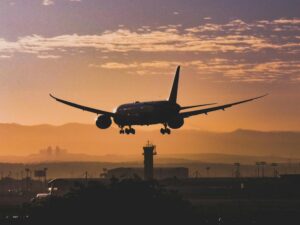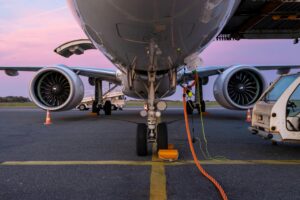Nigeria’s aviation industry stands at a critical crossroads. While the federal government pursues ambitious plans for a national carrier, indigenous airlines face an existential threat from converging crises not of their making. The contrast couldn’t be starker: as existing carriers struggle to secure basic operational necessities, government attention remains fixed on prestige projects that do little to address immediate industry needs.
Just months ago, the outlook for Nigeria’s aviation sector appeared markedly different. Indigenous carriers like Air Peace showed promising growth and expansion potential. Today, these same airlines fight for survival against overwhelming odds.
A Perfect Storm Batters Nigerian Carriers
The challenges confronting Nigerian airlines represent a perfect storm of operational obstacles. Acute aviation fuel scarcity undermines schedule reliability. When fuel can be found, its skyrocketing cost devastates operating margins. Airlines face crippling foreign exchange shortages when attempting to pay for maintenance, parts, and training. The 90-day closure of domestic runways forces flight rerouting, causing both schedule disruptions and additional fuel burn.
The voluntary suspension of scheduled passenger service by Aero Contractors and the regulatory grounding of Dana have further reduced industry capacity. With demand potentially exceeding supply on key routes, passenger fares inevitably rise even as airlines operate on knife-edge margins.
“The issue at the moment is not one of scale for the Nigerian airlines, it is one of survival,” notes an industry insider familiar with the situation. This survival requires immediate intervention on multiple fronts – secure access to foreign exchange at official Central Bank of Nigeria (CBN) rates, consistent aviation fuel supply at manageable prices, and reconsideration of the domestic runway closure strategy.
Yet amid this industry-wide emergency, the federal government maintains its focus on launching a national carrier. This approach reveals a fundamental disconnect in aviation policy priorities.
National Carrier Dreams vs. Industry Reality
The government’s commitment to establishing a national carrier appears undiminished by the current crisis. Some officials view the industry’s struggles as justification for this project rather than as a call to address underlying structural issues.
This thinking reflects a troubling pattern. Rather than providing emergency support to private entrepreneurs driving the sector forward, authorities may prefer directing funds toward an entity in which they hold ownership stakes. This approach misses a crucial point captured perfectly in industry analysis: “Changing the players does not change the game.”
A national carrier would face identical challenges – fuel shortages, foreign exchange scarcity, and infrastructure limitations. Creating a new airline while existing carriers collapse represents a profound misalignment of priorities.
Infrastructure Needs Left Unaddressed
Nigerian airlines currently spend precious foreign exchange on C-checks and maintenance abroad – a needless drain of resources that could be addressed through domestic maintenance, repair and overhaul (MRO) facilities. The government has discussed an MRO development plan under a public-private partnership model for seven years without significant progress.
More troubling is that private sector MRO proposals received little government support during this same period. Instead, authorities created their own competing project and sought investment for it, effectively undermining private sector initiatives that might have addressed this critical need years ago.
This pattern reflects what one observer characterizes as governance through “a series of transactions rather than strategic, policy-driven initiatives.” Current infrastructure investments in airports, the national carrier, an aircraft leasing company, and aerotropolis developments proceed while the industry’s lifeblood – affordable fuel – remains unavailable.
International Fare Surge Adds Pressure
International travelers from Nigeria face their own crisis as ticket prices surge beyond reach for many. This phenomenon results from multiple converging factors. Post-pandemic demand has spiked as travelers use expiring vouchers and resume long-delayed trips. Aviation fuel cost increases have triggered fare surcharges. Airports worldwide have raised fees to recover pandemic losses.
Nigerian travelers face additional burdens. Foreign airlines struggle with over $450 million in blocked funds – revenue they can’t repatriate due to Nigeria’s foreign exchange scarcity. Their response? Removing lower fare classes from the Nigerian market. Airlines forced to source dollars on the parallel market price tickets accordingly, eliminating fare categories that wouldn’t generate adequate returns when converted at realistic rates.
The naira’s depreciation against the dollar further compounds the problem, making tickets originating from dollar-based calculations progressively more expensive for Nigerian travelers.
Some passengers report shocking charges – up to ₦500,000 for simple date changes. These fees don’t represent administrative costs but rather the fare differential between booking time and current market conditions, reflecting the volatile economic environment.
A Path Forward Requires Priority Reset
Nigeria’s aviation sector requires immediate intervention focused on survival fundamentals before pursuing grand development visions. Industry specialists consistently identify three urgent priorities:
First, aviation fuel availability must be secured and pricing stabilized. Without fuel, airlines cannot operate regardless of other investments in the sector.
Second, foreign exchange access at official rates remains critical for maintenance, parts acquisition, and essential payments. The Central Bank’s policies currently work against industry interests rather than supporting this strategic sector.
Third, infrastructure development should prioritize essential operational needs – like domestic MRO facilities – rather than prestige projects. Supporting existing private sector initiatives often delivers faster results than government-led alternatives.
The situation demands a fundamental shift from transaction-based governance to strategic policy. Rather than pursuing disconnected projects, authorities must develop a comprehensive aviation strategy that addresses immediate survival needs while building toward long-term development goals.
Beyond the National Carrier Debate
The question isn’t whether Nigeria deserves a national carrier. The question is whether Nigeria can afford to lose its existing aviation industry while pursuing that ambition.
Indigenous carriers have demonstrated their capacity for growth and innovation under better conditions. Air Peace and others expanded routes, improved service quality, and built international connections before the current crisis. These achievements suggest that with appropriate policy support, existing carriers could fulfill many national aviation ambitions without the massive investment a new national carrier requires.
Government and industry must partner to address immediate survival needs. Only after stabilizing existing operations can Nigeria realistically pursue broader aviation development goals. Without this priority reset, both existing carriers and any national airline will face the same insurmountable challenges.
The path forward requires pragmatism over prestige and survival over symbolism. Nigeria’s aviation future depends not on building new castles but on reinforcing the foundations that keep its current fleet flying.
Disclaimer: The insights shared in this article are for information purposes only and do not constitute strategic advice. Aviation markets and circumstances vary, and decisions should be based on your organisation’s specific context. For tailored consultancy and guidance, please contact info@avaerocapital.com.




